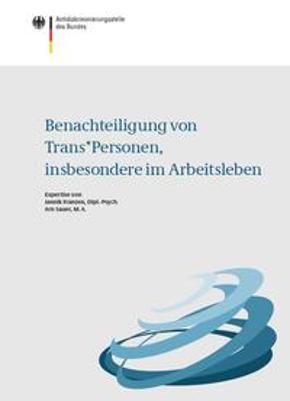Discrimination
against trans* persons, particularly in the world of work
- Factsheet on the research project -
Authors: Jannik Franzen, Arn Sauer, published by the Federal Anti-Discrimination Agency (FADA) Year of publication: 2010
Brief overview
The expert opinion provides insights into the research history, the theoretical approaches and central topics of research related to trans* persons. Moreover, it summarises the results of international studies on the discrimination of trans* persons in various areas of society, particularly in the world of work, and compares them with the situation in Germany.
Main results
Defenition of terms
Trans*
is a meanwhile well-known umbrella term in German-speaking countries that refers to a rich diversity of identities and lifestyles. The asterisk serves as a placeholder for various lexical compounds in German.
Transgender
is used, inter alia,
- for types of gender change or modification other than those envisaged by the medical transsexuality model
- as a political term for identities and lifestyles that challenge the binary gender model,
- as an umbrella term for diverse types of trans*.
Transgeschlechtlichkeit (gender non-conforming)
denotes a multitude of sexual and social interactions beyond the binary model without referring to medical terms.
Trans* identity
The term emphasises the identity aspect and drops the reference to sexuality in “transsexual“.
Trans* sexuality
is a clinical psychology category denoting the persistent strong urge to belong to the “opposite“ sex and to change one’s body accordingly.
Intersex persons
(also: intersexuals, inter* persons, androgynes, hermaphrodites) are born with ambiguous sex characteristics. Care must be taken to distinguish between the discriminatory and human rights situations, concerns and legal as well as medical positions of intersex and trans* persons.
Zwischengeschlechtlichkeit (non-binary gender)
The term comprises various self-definitions and lifestyles on a continuum between the two sexes or beyond them.
Structural discrimination in medical-psychological and legal practices
Applicable legal provisions only allow a change of name, civil status or sex after lengthy and very stringent diagnostic procedures. Access to medical care and cost reimbursement by the health insurance funds is only possible for trans* persons who are diagnosed as being “transsexuals”. This means that the individual’s gender identity is pathologised, i.e. considered and treated as a disorder. The trans* persons themselves are patronised through these practices and their personality rights violated. For instance, a sex change requires evidence of infertility.
The medical-psychological and legal assessment procedures are based on a gender model that only allows unambiguous classification and no intersex lifestyles. The individual is not allowed to decide their gender identity themselves, but this decision is delegated to doctors who are frequently overwhelmed by the diversity of self-perceptions, identities and aspirations of trans* persons and are not sufficiently knowledgeable or sensitised to cope.
Discrimination in the world of work and other domains
The evaluation of international studies reveals that trans* persons are severely discriminated against on an individual and structural basis. For instance, unemployment and work disability rates are above average among trans* persons. They have poorer career opportunities and their pay is below average. Trans* pupils tend to have lower grades. Many trans* persons live in precarious housing situations, the risk of homelessness is above average. The way public authorities and their representatives deal with trans* persons is described as discriminatory.
Social isolation, experience of violence and psychosocial health
The majority of trans* persons have a history of experiencing discrimination and violence. The confrontation with transphobia and discrimination causes fear of the consequences of openly living their true identity. Therefore, many trans* persons hide their trans* identity at work and in their private and family environments or are eager to 'pass' as a person of a certain sex. Trans* persons are therefore threatened by social isolation. Feelings of fear and insecurity affect their psychological and physical well-being. Depression and suicide attempts are particularly frequent among trans* persons.
Lack of support from ports of call and counselling centres
Ports of call in the world of work, such as unions, among public authorities such as the police, in the field of medicine or in counselling centres are reported to be lacking in awareness and knowledge when it comes to dealing with trans* persons. Therefore, the latter experience an absence of support facilities they can turn to and confide in.
Options for action
- Reform of the diagnosis and assessment practice and control of the patronisation involved in sex changes to give the persons greater self-determination.
- Individualisation and depathologisation while ensuring the same level of access to medical measures and cost reimbursement.
- Public inclusion and increased visibility of trans* persons, activists and organisations.
- Sensitisation of ports of call and counselling centres.
- Raising public awareness, sensitisation and targeted training of officials and employers.
- Creation of trans* sensitive environments and administrative procedures that do not require clear sex assignment (e.g. applications, toilets, work clothes).
- Empirical surveys to identify the number and social situation of trans* persons living in Germany.

